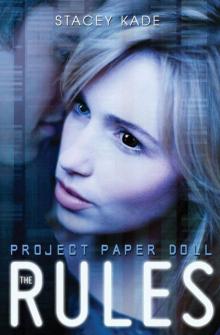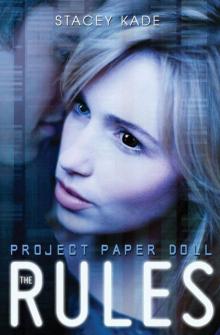- Home
- Stacey Kade
The Trials Page 4
The Trials Read online
Page 4
Eyes watering fiercely, I bent down and scooped the backpack off the floor and jammed the empty lens packaging in a front pocket that was empty but for what appeared to be a half-eaten granola bar. Lovely.
I turned and faced my audience.
Dr. Jacobs looked me up and down in evaluation. His lips pursed in displeasure.
“Pull your hair up.” He fished around in his pocket and pulled out a dirty green rubber band that looked as though it had recently been wrapped around mail or something.
“What exactly is the point of this?” I asked, hoisting the backpack onto my shoulder and then gathering my heavy hair into a rough ponytail. Were we going to be judged by our ability to assemble a ridiculous ensemble from items from the lost and found?
“No,” he snapped. “Braid it.”
“I don’t know how,” I said through clenched teeth. I hated him so much, sometimes it felt as if it were burning a hole outward through my chest.
He paused, seemingly mystified by this gap in my education.
“Not a lot of slumber parties in my recent past, remember?” I asked.
He heaved an impatient sigh. “I don’t care what you do with it. Just make it look normal.”
I laughed. I couldn’t help it. As if I hadn’t been trying to do that for most of my life, with little success. “Is this a costume party?” I asked, wrenching my hair up into the barely contained ponytail I’d worn to school every day back in my “real” life. “I’m going to look like a little kid playing dress-up.”
He pursed his lips. “It doesn’t matter, 107. The point is simply for them not to recognize you for what you are.”
I raised my eyebrows. Wasn’t the whole point of this to show us off?
With some impatience and more than a little pride, he explained, “We’re emphasizing our strengths.”
“By dressing me in someone else’s clothes?” I asked slowly.
When that wasn’t enough, he elaborated impatiently. “We want to give them a chance to see what they’re getting, 107. First impressions are everything, and we want to win them over as close to the start as possible by demonstrating our advantage.”
And Jacobs’s big advantage in me? That I already knew: I played human far better than Ford.
I stared at Dr. Jacobs. That was his magical plan? I was going to walk in and…out-human her? By what? Looking normal and harmless, I suppose. It was either the most brilliant or ridiculously stupid scheme in the history of such things. And in other circumstances, where I didn’t intend to strike first, it might well have gotten me killed by giving off “easy target” vibes.
“Sounds great,” I said in response to his questioning look. Whatever. I wasn’t here to see him succeed in selling me.
I managed to get my hair somewhat under control, though the individual strands would continue to frizz and wave without the addition of product.
“Good enough,” Jacobs said in a tone that suggested anything but. He took my elbow, pulling me along down the hall, toward a door I hadn’t noticed until now.
“Just remember,” he said to me as the guards fell in behind us. “You’re a regular human.” A vein in his forehead, throbbing and blue, pulsed with intensity behind his words, as if it might burst at any second.
This from the man who’d done everything he could to take that “regular” humanity away from me, to remind me that I had no right to it?
The urge to help that vein on its way to an embolism right now seized me, but I resisted. Barely. The idea, though, made me smile, twisting my mouth into something ugly. And I found I didn’t care anymore.
I wanted to defeat Dr. Jacobs, to stand over him in triumph.
Or, okay, at the very least, see him howling in immense pain and possibly—no, definitely, bleeding.
See? Compromise. That really is the key to success.
THE DOOR DR. JACOBS PULLED me through led to, what else, another hallway. This one, though, was in the hotel proper. Music played faintly in the distance, and my feet, which were still in my old Chucks, sank into plush carpet. Dim, soothing lighting, a harsh contrast to the brightly lit service corridor, made it difficult for me to see more than a few feet ahead.
Fortunately, we weren’t going far. Dr. Jacobs headed toward the first door on the left, marked THE MEADOWLANDS. It was a glossy wooden door, not the banged-up, overpainted versions I’d seen in the service portions of the hotel, and it was closed, with another pair of black-clad guards in front of it.
But as we approached, they didn’t move away or defer to Dr. Jacobs as I would have expected.
“Let us pass,” Jacobs said through clenched teeth.
It was only then that I noticed the bright blue logo of Laughlin Integrated on their sleeves. Oh, now it was a party. BYOST. Bring Your Own Security Team.
They backed up a step reluctantly, so much so that I wondered if Laughlin had given them specific instructions to give Jacobs a hard time.
“Wait out here,” he said to the four GTX sentinels behind us. Then he barged between Laughlin’s men, pulling me after him by the arm.
The handle turned easily, not locked, and I held my breath, not sure what to expect, as Jacobs yanked the door back and crossed the threshold, letting go of me as soon as I was in the room.
I resisted the urge to rub my arm as my eyes adjusted to the much brighter fluorescent light inside. Whatever I’d been anticipating, it wasn’t this.
Three long tables covered in white tablecloths were arranged in a U-shape, with a fourth table at the front of the room. The tablecloth on the fourth table was black, though, which made it seem more important.
Each table held a pyramid of shining drinking glasses and a sweating pitcher of water. A whiteboard, housed in a large wooden cabinet with the doors partially open, dominated the far wall, behind the head table. Glass decanters of juice, a tray of muffins, and a bowl of fruit held prominent position on a built-in counter to my right.
All absurdly normal. Almost insultingly so, considering why we were there.
That is, until you lingered long enough to pick up on the massive waves of tension rolling through the space.
The man closest to us was at the bottom table in the U by himself. He looked over his shoulder at us briefly and then resumed studying the phone in front of him, as if urgently awaiting a call or text or the summons to raid in Book of Heroes. He was younger than both Dr. Jacobs and Dr. Laughlin, who was what my friend Jenna’s mother would have called “well preserved.” This guy was probably in his late thirties. His dark hair was rumpled, and his leg was jouncing with anxiety, making the glasses on his table wobble and clink in their formation.
I frowned. This must be Emerson St. John. Something about him seemed familiar, but I couldn’t figure out why or how I would know him. Dr. Jacobs would certainly never have let him in the GTX lab. But where was his “product”? Was St. John already disqualified in some way?
On the right side of the U, several faces I knew stared back at me. One I knew very well. Ford, my clone for lack of a better term, stood on the inside of the semicircle created by the furniture arrangement, next to Carter. They were wearing their school uniforms: white shirts beneath blue blazers with a plaid skirt for Ford and khakis for Carter. Laughlin’s attempt, no doubt, to make them seem relatable and human. If anything, it emphasized how human they were not. The dark blue of the coats only made their hair look whiter and their skin more gray. The preternatural stillness they…we have was so much more noticeable in isolation.
Full-blooded humans twitch, sigh, bite their nails, expressing their anxiety in motion. We are the opposite. It had taken many years for me to adapt to that particular quirk, to create one of my own. Now I bite my lip out of habit, rather than imitation, but it hadn’t started that way.
Ford glanced over her shoulder at me, her expression flat. She looked harder or sharper somehow, as if the last weeks had compressed her from raw material into something more deadly. Grayish blue circles marred the skin beneath her eyes,
and a new hash mark decorated her cheek.
It hurt to see those marks on her face, a reminder of what had been lost. One for Johnson, the hybrid who’d been eliminated when she couldn’t blend in at school, and the other for Nixon.
Nixon. He’d never had a chance. To survive or actually live. I wondered if they’d preserved his body in the gallery with all the others, leaving him permanently staring out at the quarters where he’d once lived.
Ford gave no acknowledgement of our previous acquaintance. Angry at me, perhaps, for our failed attempt at rebellion, the one that had cost her Nixon. Carter, though, greeted me with the corner of his mouth lifting in the tiniest of smiles.
He, too, looked weary and paler than usual. Whatever he and Ford had been through since I’d seen them last had taken its toll. The fact that he was still capable of smiling made me hate everyone else in the room just that much more. He deserved better than this. We all did.
At the table, Dr. Laughlin cleared his throat, glaring at Ford and Carter and jerking his head in an indication that they should both face forward. His two assistants, dark haired, beautiful, and strikingly similar, sat up straighter, their tablets at the ready for any words of wisdom he might drop.
It wouldn’t be a hardship to kill Dr. Laughlin when the time came. I eyed him carefully, a greasy feeling of anticipation slipping through me. Perhaps that glass water pitcher to the head. The base of it looked heavy, and it only takes fifteen pounds of pressure per square inch to fracture a human skull. Your bones may be stronger than mine, but that does not make you indestructible.
The left side of the U was empty. I trailed after Dr. Jacobs, avoiding Dr. St. John’s chair as we walked to our seats.
At the head table, two men and a woman were seated. None of them were wearing anything to identify them as military, but it seeped through in the details. The old white guy on the far end had a buzz cut that screamed armed services. The blond woman in the middle, her hair in a blunt cut that stayed out of her face as if it was too afraid to stray, had her back so straight that she didn’t even appear to need the chair. The younger man was African American and wore a serious “don’t mess with me” expression on his acne-scarred face.
In short, though they weren’t wearing uniforms, you’d have to be blind to miss what they were.
This was the Committee—our judges, our jury, our executioners.
I watched them watching Ford and Carter. Then those evaluating gazes shifted to me, cold, unemotional, and yet still eager. The open avariciousness in the woman’s expression made my stomach churn and my palms sweaty. Under those eyes, I felt small and stripped of not just my human “disguise” but everything that made me me. They did not see us as people. We were something to be acquired.
“Dr. Jacobs, I assume this is your submission…finally?” the one I was calling Morpheus, after the character in The Matrix, asked suddenly, his voice ringing loud in the otherwise quiet space.
The back of Dr. Jacobs’s neck flushed with color as the attention in the room shifted from me to him. “It is. My apologies again. There were final preparations to make,” Dr. Jacobs said.
As one, the three Committee members looked to me again with critical eyes, as if to determine what last-minute enhancements might have been performed. I doubted any of them would have honed in on the sweatshirt, contact lenses, and freaking backpack.
I didn’t care if Jacobs’s ridiculous “out-humaning” gambit actually worked, but given my plans for ending all of this as quickly as possible once everyone was in place, I’d have preferred not to have stares pinned on me.
Fortunately, Dr. St. John, who’d been staring at me as well, chose that moment to pipe up. “We have a prototype and a special model arriving shortly.” He tapped a message into his phone and sat back in his chair, looking all too pleased with himself suddenly.
“Might I point out that our prototypes are functional and capable of telling time?” Dr. Laughlin asked with a smarmy smile.
Blech.
“We’re not waiting any longer,” the woman warned, pointing a pen at St. John. “It’ll be up to you to make sure your product is informed of the boundaries and restrictions.” She paused with a tight smile that wreathed her face in wrinkles, revealing her true age. “Disqualification would be…unfortunate.”
“Not a problem,” Dr. St. John assured her.
Dropping my prop backpack on the floor, I sat down next to Dr. Jacobs, my heart tripping over itself suddenly. I could feel the irregular beat shaking me from head to toe. How had I ended up here?
A little over a month ago, I’d been getting ready to start my junior year, and my biggest worry was about blending in. Zane Bradshaw had been a stranger, a pretty boy lacking a spine, at the periphery of Rachel Jacobs’s circle of piranhas. I’d had no idea that my life Outside was a complete sham, a scheme to teach me more about being human and help me regain the abilities I’d blocked.
Now Zane was dead and I was here, in a surreal version of the world that had me facing down not only my creator but also the people who were even more responsible for my existence. After all, there’s no point in supply if there is no demand. And the three at the head table—or someone within their organization—had provided the alien genetic material and asked for the impossible: alien-enhanced soldier/assassins. Which GTX, Laughlin Integrated, and presumably Emerson had happily leaped to provide.
My palms were damp, and I wiped them unobtrusively down the legs of my jeans, out of sight beneath the table.
Focus. Be calm. Evaluate the situation. Prioritize your objectives.
The old guy cleared his throat. “Thank you, gentlemen, for coming today. And for your work in support of the security of this great country.”
Because the best defense is a good offense. The line from an old movie, a comedy and one of the few my father had actually watched and enjoyed, ran through my head.
“Melody has additional information for you regarding the specifics of what will be required,” he said, gesturing carelessly at the woman next to him. “Melody?”
Her mouth pinched in clear displeasure—pissed that he’d used her name, perhaps, or that the doling out of details had been delegated to her—but she nodded. “You have an assigned target for this mission,” the woman said, speaking to Jacobs, Laughlin, and St. John, as if they were the ones doing the work. Now that the novelty had worn off, Ford, Carter, and I had ceased to exist, no more a party to this discussion than the furniture. “In the packet, which you’ll receive at the meeting’s conclusion, you’ll find the target’s photo, some basic information about the target, and a phone for designated check-ins. Find the target, confirm identity by taking and transmitting a photo, and then await further instructions.”
Well, that explained why we were here in the middle of the city. Dumping us all into an echoingly empty warehouse wouldn’t be much test of our tracking skills.
If that was, in fact, what they were testing. The “await further instructions” bit gave me a weird vibe. I couldn’t read Melody’s thoughts—she was military trained and, obviously, they’d all been briefed on what we were capable of—but excitement glittered in her eyes.
I shifted slightly in the chair, taking a slow, deep breath. If I was going to do this here and now, the three of them—Old Guy, Melody, and Morpheus—had to be first priority. They were soldiers, past or present; they had, most likely, faced some form of attack in the past.
People like them never let their guard down completely.
“From the itinerary our sources have assembled, the target should be within the city limits for the next forty-eight hours,” Morpheus added.
I ignored him. The trick would be taking out as many as I could at once. The moment one of them went down, the room would dissolve into chaos. And I’d have to devote my effort to holding the doors against the guards and addressing any additional threats inside the room.
“Discretion is a mission requirement. No exceptions. But you may eliminate the competition
as you see fit, provided it doesn’t violate that order,” he said. “This is a test of strategy as well as skill.”
I reached out with my abilities and tugged gently at the wooden cabinet housing the whiteboard, testing. It wobbled, spilling out a blue marker that landed on the floor behind the three with a quiet thwap on the carpet.
Ford stiffened. She’d noticed.
Crap. I released the cabinet immediately, letting it settle gently against the wall again.
But no one shouted or pointed as Morpheus continued outlining mission standards. Dr. Laughlin was too busy rocking on the two back legs of his chair and smirking at Jacobs, who was glaring death at him. St. John had resumed the study of his phone.
Ford risked a sharp glance over her shoulder in my direction. Warning or questioning me? It was impossible to tell.
I returned my attention to the cabinet. It was loose, definitely. If I could pull the entire structure free of the wall and send it at their heads with enough force—
“Is the target aware of his status as such?” Ford asked abruptly.
The ensuing silence was breathtakingly loud.
I froze. What was she doing? They hadn’t, as far as I knew, been instructed to keep quiet, but these military types likely weren’t used to being questioned, particularly by beings they equated to weapons, nonsentient tools.
Laughlin set his chair down with a resounding thump, his angled face a dozen shades of furious. “Ford,” he barked. Carter cringed, inching closer to Ford, whether for protection or to protect her, I wasn’t sure.
But the one I’d dubbed Morpheus nodded approvingly. “No. It…she is correct. That would change the parameters.” To Ford, he said, “The target has no reason to feel hiding is necessary.”
Jacobs reached over and pinched my arm, signaling in a flurry of confusing motions that I should stand and do something. Evidently, he didn’t want Ford getting too much positive attention from the Committee.

 The Rules
The Rules The Trials
The Trials For This Life Only
For This Life Only The Ghost and the Goth
The Ghost and the Goth Finding Felicity
Finding Felicity The Hunt
The Hunt Body & Soul
Body & Soul Starlight Nights
Starlight Nights Queen of the Dead tgatg-2
Queen of the Dead tgatg-2 The Ghost and the Goth tgatg-1
The Ghost and the Goth tgatg-1 738 Days: A Novel
738 Days: A Novel The Ghost and the Goth 2 - Queen of the Dead
The Ghost and the Goth 2 - Queen of the Dead Project Paper Doll: The Trials
Project Paper Doll: The Trials Body & Soul (Ghost and the Goth Novels)
Body & Soul (Ghost and the Goth Novels) Project Paper Doll
Project Paper Doll